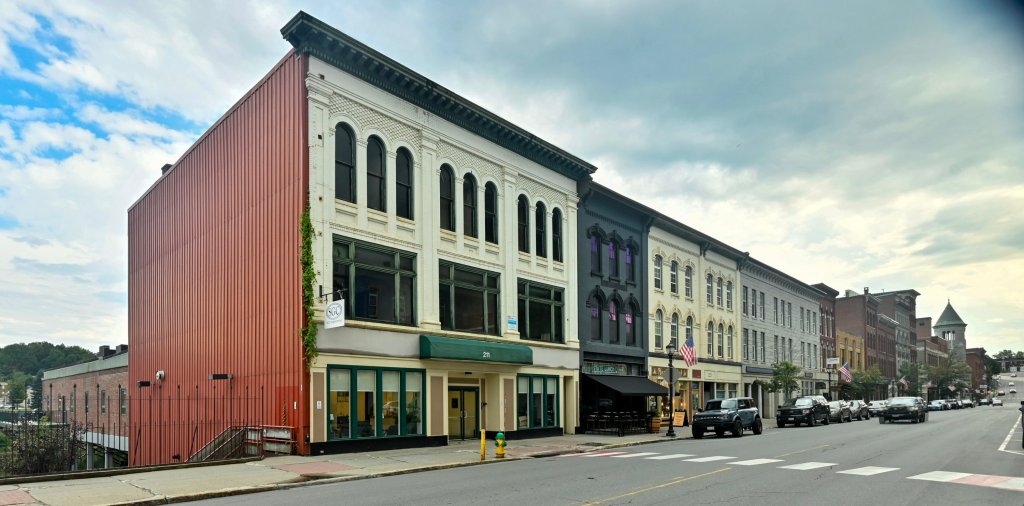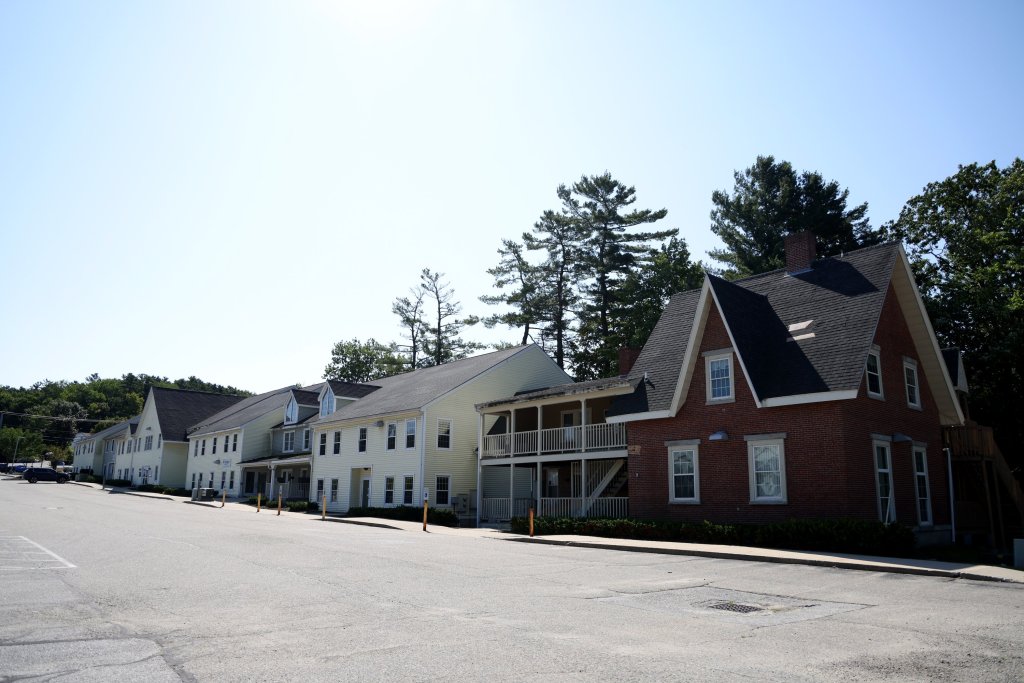More than 1,000 new housing units have been approved in Maine’s capital city since the start of 2024, and they are expected to help address the local and statewide housing shortage.
While some of the new projects will include affordable housing, many are market rate apartments and higher-end housing. So it’s not yet clear whether the influx of new housing development will lower sky-high housing costs or help reduce homelessness. But there is hope they will.
Norman Maze, executive director of the Augusta Housing Authority, said the large number of housing units in the works in Augusta is good news, because it is so badly needed. The housing authority’s wait list, which is a combined system including 19 other Maine housing authorities, is 22,000 households long.
Maze said the list is so long it can take three to five years before a family on it finds housing. But even families who can wait that long often don’t end up finding a place to live through the authority, because most can’t find units with rent within federally set fair market value standards. Maze said only 20% to 30% of households on the waiting list find housing within the allowed rent limits before their housing vouchers expire.
In 2022, a MaineHousing study determined Augusta needed 449 family and 424 senior affordable housing units to meet demand.
The 2023 State of Maine Housing Production Needs study estimates Kennebec County needs between 9,100 and 9,700 additional housing units to make up for the current lack of housing and accommodate the housing needs for the county’s projected population in 2030.
An Augusta Task Force on Homelessness report notes while the focus on addressing homelessness “rightly emphasizes the importance of affordable housing, research indicates that increasing the overall housing stock, regardless of price point, can also enhance access to affordable housing for low-income renters. Though this benefit doesn’t occur right away, there is research that expanding the supply of housing at all levels can help alleviate market pressures, indirectly making housing more attainable for those in need.”
Amanda Bartlett, chief operating officer of Portland-based housing developer Developers Collaborative, who served as a consultant to the Augusta Task Force on Homelessness, said a key takeaway from the task force’s work “always came back to the solution to homelessness is housing.”
A constant need
Enticing developers to build housing in the city to ease the housing shortage has been a top goal of city officials for the last several years.
Housing is deemed “affordable” in Maine if the household spends no more than 30% of its income on housing-related costs, according to MaineHousing. Most affordable housing projects in the Augusta area have affordable units reserved for tenants making no more than 60% of the area median income.
Keith Luke, Augusta’s economic development director, said the direction from city councilors was to support creating housing across the spectrum — affordable, workforce, senior, and market rate — in hopes of easing the housing crisis.
“Housing is in such short supply that many families who could move up into better quality units have been unable to do so,” Luke said.
Housing projects that include an affordable housing component in Augusta include a proposal from John Miller to renovate two substantial buildings on downtown Water Street. Miller has previously renovated other downtown buildings, including the Vickery Building into 23 apartments and retail space.

Miller plans to build eight apartments at 211 Water St., and 18 apartments at 333 Water St., a prominent and historic building that was built as an Oddfellows Hall in 1900. About half of the 26 total units in both buildings would be reserved as affordable housing, with the rest renting at market rates.
Miller said he hopes to renovate both buildings at the same time to save construction costs. He’s seeking a tax break, for both buildings, projected to total around $582,000 over 21 years.
City Manager Jared Mills said 333 Water St. is in such dire condition that if it deteriorates further he fears the city would have to take action, which could be costly. In a few cases, the city has condemned dilapidated buildings and had them demolished due to safety concerns.
The Augusta Housing Authority also has a pending affordable housing project with 34 new senior housing units on Malta Street behind the Hodgkins School Apartments, the authority’s existing senior housing development. Maze hopes to close on a construction loan for that project this fall.
Volunteers of America of Northern New England is working on a proposal a couple years in the making funded by multiple sources, to create 25 affordable housing units for chronically homeless people in a planned new building on Oxford Street.
Bartlett, the development consultant for that project, known as Riverlands, said staff will be on-hand 24 hours a day, seven days a week to provide supportive services for tenants. The building will also have space for outside service providers.
Those wraparound services would include helping tenants make sure their basic needs are met, case management, and access to mental and physical health. Permanent affordable housing with those services was a major recommendation of the homelessness task force which delivered its report to the city earlier this year.
The task force, Bartlett said, identified the lack of permanent supportive housing as one of Augusta’s key gaps.
“You can’t just drop an individual into an apartment on their own with nothing and expect that’s going to work well,” she said. “Creating a housing community that understands the trauma and impacts that result from long-term homelessness is really critical to solving the challenges that unhoused individuals are having.”
Augusta Housing Authority and MaineHousing will provide vouchers to tenants in all 25 units in the new apartments, providing funding so tenants will pay no more than 30% of their income for rent.
The Planning Board has approved the project, estimated at just under $10 million. Changes to the plan means a second board review and decision. If it’s approved, construction is likely to start in 2026 and be complete in 2027.
The incentive question
Many of the projects rely in part on tax increment financing tax breaks from the city to help lower development costs and make housing projects in the city more attractive to financiers.
TIFs allow municipalities to shelter property taxes generated by new development within designated districts. Sheltering money through a TIF means it would not be added to the city’s total property valuation for state tax calculation purposes. Without that, as a municipality’s total property valuation increases, its state-provided revenue — such as aid for education and revenue sharing — decreases, and its county tax liability increases. New value sheltered in a TIF doesn’t count toward a municipality’s property tax value.
At a recent City Council meeting, elected officials considered granting a tax break estimated at $4.3 million to A.R. Development, a Pittsburgh-based company that has more than 10,000 housing units in 15 states.
“Bringing a variety of new housing to the community has been a top priority of the (Augusta City Council) for several years now,” Luke said, “and it’s because of that stated commitment that we’ve been working as aggressively as we can with the development community to bring new housing units.”
The company plans to build 144 units, at a cost of about $32 million, at 443 Civic Center Drive that are expected to rent for upward of $1,600 each a month.
“We’re doing as much as we can in that regard and we are being a little bit aggressive and that’s why many of these people are sitting here,” Luke said. “We’re anticipating a short-term investment of $32 million into this community for an incentive of $4.3 million over a lengthy period of time. I think there are many communities in the state that would jump on this type of incentive if they conceptualized it and they had the opportunity we have with some of these developers right now.”
Other major projects include a $73 million plan by Massachusetts-based developer John Flatley Co. to build 260 apartments on Eight Rod Road. The company is seeking a TIF tax break capped at $10 million over 30 years.

This project, like other large-scale projects proposed in Augusta, is likely to be assessed by the city for much less than what it would cost to build due to tax assessing rules and the lack of comparable properties. In this case, that’s estimated to be less than $23 million.
That’s a major reason developers of large-scale projects seek tax breaks — to help make the projects more attractive to lenders, who see a difference of $50 million between the cost to build and the value assigned, making the loan a risky one.
A proposal approved by the Planning Board last month will convert office space in multiple buildings at 24 Stone St. into 34 or 35 apartments, including studio and one- and two-bedroom units. The site was previously home to low-income apartment buildings, which were razed to make way for the CVS nearly two decades ago. Now, owners Jason and John Hutchins plan to convert some of the office space spread over several standalone buildings into apartments.

We invite you to add your comments. We encourage a thoughtful exchange of ideas and information on this website. By joining the conversation, you are agreeing to our commenting policy and terms of use. More information is found on our FAQs. You can modify your screen name here.
Comments are managed by our staff during regular business hours Monday through Friday as well as limited hours on Saturday and Sunday. Comments held for moderation outside of those hours may take longer to approve.
Join the Conversation
Please sign into your CentralMaine.com account to participate in conversations below. If you do not have an account, you can register or subscribe. Questions? Please see our FAQs.